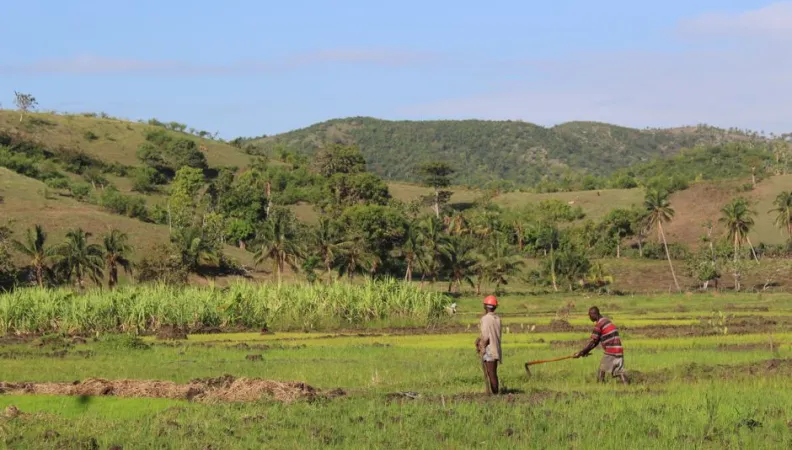Share the page
Improving food security in Haiti
Project


-
Project start date
-
Status
Ongoing
-
AFD financing amount
-
€ 20961215
-
Country and region
-
Location
-
Arcahaie
-
Type of financing
-
Beneficiaries
-
Ministry of Agriculture Natural Resources and Rural Development
AFD is helping Haiti strengthen food-producing sectors in several departments. This project should improve food security by increasing agricultural production and contributing to reducing poverty in rural areas.
Context
For the past twenty years or so, Haiti has been faced with a situation of serious food insecurity, which is both chronic and marked by acute crises. In December 2015, following the droughts, the food insecurity rate reached 47%, including 10% of the population severely food insecure (CNSA, 2016). The main cause of food insecurity is household poverty. The agriculture sector, which provides 40% of income in rural areas, is declining and only generates 25% of GDP. Haitian production has been subject to international competition since the borders were opened up (1980s and 1990s) which, in a context of increasing population pressure on resources, has contributed to a 15% drop in agricultural incomes. While agricultural production covered 80% of national food needs in 1981, it currently only covers 40% of the country’s needs.
The development of Haiti’s agriculture sector faces many difficulties, including a lack of access to financing, technologies, advice and training. Investments on farms remain limited. The deterioration of infrastructure, such as irrigation systems and storage equipment, limits production. Haitian agriculture is consequently not competitive with imports. The added value created remains low in most of the food-producing sectors. It is also highly vulnerable to climate hazards such as cyclones.
Description
The SECAL project, for a total amount of EUR 21.2m (including EUR 9m delegated by the European Union), aims to contribute to improving food security and incomes for rural populations. It also contributes to helping populations recover following Hurricane Matthew, which hit the South in October 2016. Several priority sectors have been targeted to achieve this. The sectors of corn and beans (associated with groundnuts) are being supported in the South department, and the plantain banana sector is being supported in the West and Artibonite departments. It more specifically involves recapitalizing farms, increasing and improving the production, conservation, processing and marketing of these agricultural products, and improving the redistribution of the added value. The project is led by the South Department Directorate of Agriculture and started in February 2013.
The rehabilitation works on the irrigated areas of Avezac are a key component. This is also the case for the assistance provided to the irrigators’ associations of these areas in order to structure and strengthen these institutions, which will ensure the sustainability of the facilities. From 2013 to the end of 2016, about 1,000 corn and bean producers were supported during 8 crop years thanks to the distribution of subsidies to purchase seed and fertilizer and for tilling. These producers are assisted in their technical choices by a Haitian NGO. In the West and Artibonite departments, the irrigators’ association has been structured and research is developing solutions for the intensification of banana production. In 2017, assistance was launched for the goat and pig sectors in the South.
Response to Hurricane Matthew
The SECAL project started in 2013 with EUR 16.2m of financing, including EUR 4.7m delegated by the European Union. Hurricane Matthew in October 2016 had a devastating effect on producers on the plains of Les Cayes (loss of crops, trees, animals, leading to a major loss of capital) and damaged irrigation infrastructure. In response to the Ministry’s post-Matthew recovery plan, the South Department Directorate of Agriculture reallocated project funds to finance the November planting season and organized cash-for-work activities (canal dredging). AFD and the EU subsequently set up additional financing to support 2,000 producers for each crop year until May 2019. The project amount now stands at EUR 21.2m.
AFD allocated an additional amount of EUR 1m in December 2016, which financed support for the spring planting season (February-June 2017). The winter planting season (November-February 2017) also needs to be financed. It is planned to invest in local corn processing and distribute small ruminants (goats, pigs) to the worst affected households. The additional EUR 4m from the European Union will contribute to the recovery of the South department by supporting additional crop years until 2019, creating further developments on the irrigation canals (bank protection), and supporting irrigators’ associations. The cross-cutting aim is to strengthen the resilience of the rural population.
Impacts
- Increase in producers’ incomes and assistance in post-Matthew recapitalization;
- Improvement in corn processing and quality to give access to more profitable markets;
- Structuring of irrigators’ associations;
- Capacity building (techniques, management, leadership) for the South Department Directorate of Agriculture.


